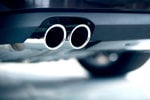Review
How things have changed. In a few weeks Peugeot will launch the latest diesel in the 307 range which covers 0-62mph in 9.8 seconds and doesn't run out of steam until it reaches 125mph.
The car will be the most powerful diesel 307 to date and the first Peugeot to use the new 16-valve second-generation 2.0-litre HDi engine.
Boasting 136bhp, it will offer the same combined fuel consumption and carbon dioxide emissions as the existing 110bhp 2.0-litre HDi engine, but will be Euro IV- compliant, offering company car drivers the minimum 15% benefit-in-kind tax liability for the next two years. It also comes with a six-speed manual transmission as standard and is offered in three-door, five-door and SW variants.
The new engine, developed as part of the diesel partnership between PSA Peugeot Citroen and Ford, has already gone on sale in the Ford Focus C-MAX.
It will feature in Volvo's forthcoming S40 and V50, as well as cars from other manufacturers involved in the shared technology.
The Peugeot 307 HDi 136 is well timed as the new Volkswagen Golf will be offered with a 140bhp diesel, while Renault is also likely to launch a Megane with a similar power output before too long.
The Fiat Stilo also gets a beefy 16-valve 1.9 JTD and Vauxhall's new Astra will have a 150bhp diesel.
Based on the existing 2.0-litre HDi, the new Peugeot engine has higher pressure fuel injectors. There is a variable geometry turbocharger and six different phases of injection – the first two reduce combustion noise (or 'diesel knock'), two main injections provide power and enhance torque and two post injections manage regeneration of the particulate filter.
The filter needs maintenance at 75,000-mile intervals with an additive top up and filter replacement, so most cars shouldn't incur this expense during their time on a fleet.
The engine has an 'overboost' function, allowing maximum torque to be increased from 236lb-ft to 250lb-ft for short periods. It is activated when the engine is under full load between 1,750rpm and 3,200rpm and gives the car an extra surge for safer overtaking.
Behind the wheel
THE subtle distinguishing feature of the new engine in the 307 is a red 'i' in the HDi badge on the tailgate. Apart from that it could be any other 307, but this one is a true high-performance diesel.
Although it can be noisy at idle, particularly when starting from cold, it soon settles down and is a quiet and refined companion on the move. The six-speed manual transmission is a little unco-operative and rather sticky, like most Peugeot manual transmissions, but there is so much torque on offer that you don't need to change gear very often.
That Peugeot has achieved the same level of fuel consumption and CO2 emissions as the less powerful, non-Euro IV-compliant 110bhp 2.0-litre is made all the more impressive when you feel the shove in the back when you squash the throttle pedal.
Suspension has been modified at the front to correspond to the difference in weight and the car's more dynamic characteristics, while an electronic stability programme (ESP) is fitted as standard.
While the 307's ride and handling were always surefooted, they were nothing exciting, but the ride is comfortable and the neat interior and slush-moulded dashboard makes it a very pleasant environment in which to cover long distances.
Driving verdict
THE new engine in the 307 is a real firecracker and exceptionally economical for the power it produces. It whets the appetite for more of the same as Peugeot continues to roll out the next generation of diesel engines.
Model: Peugeot 307 HDi 136
Engine (cc): 1,997
Max power (bhp/rpm): 136/4,000
Max torque (lb-ft/rpm): 236/2,000 (250 on 'overboost')
Max speed (mph): 125 (SW: 122)
0-62mph (sec): 9.8 (10.1)
Fuel consumption (mpg): 52.3 (50.4)
CO2 emissions (g/km): 142 (148)
Fuel tank capacity (l/gal): 60/13.2
Service interval (miles): 12,000
Transmission: 6-sp man
On sale: March
Price (est): from £16,000















